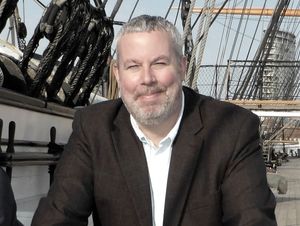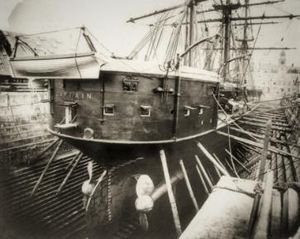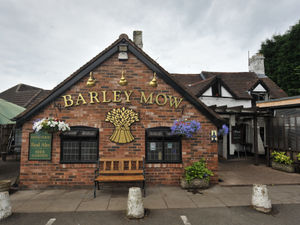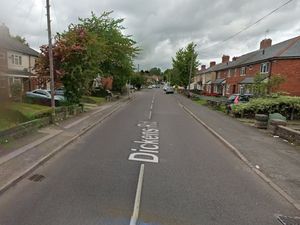Wolverhampton university researcher leading international effort to find wreck of warship
A university researcher is leading an international effort to find the wreck of a warship that has great historical significance.

University of Wolverhampton researcher, Dr Howard Fuller, has taken on the mission in consultation with the British Ministry of Defence.
Dr Fuller, who is a reader in war studies in the university’s department of history, politics and war studies at its Wolverhampton city campus, is on the hunt for HMS Captain – the most powerful ironclad-battleship in the world at the height of the ‘Pax Britannica’—which sank off Cape Finisterre, Spain, in 1870.
Her loss was one of the most infamous disasters in naval history.
An acclaimed naval historian and Fellow of the Royal Historical Society, Dr Fuller’s 2020 book on the Turret versus Broadside: An Anatomy of British Naval Prestige, Revolution and Disaster 1860-1870 - was the first comprehensive academic study of the Captain tragedy.
Over the past year, he has gathered a specialist team of naval historians, marine archaeologists, museum authorities, MOD personnel, civil servants and international authorities from the US and Spain.
With their help, Dr Fuller’s research has identified likely wreck-site locations outside Spanish territorial waters.
At the same time, he has worked closely with a Galician-based documentary production company also intent on finding the wreck of HMS Captain off Spain’s ‘Costa da Morte’; to secure co-sponsorship by the University of Wolverhampton for an exploratory marine survey using a multi-beam echosounder.
A joint expedition took place from Portonovo, Spain, to the area where local Galician fishermen have long thought the ship went down.

This resulted in the discovery of four unidentified shipwrecks, the last of which showed dimensions and a general configuration approximate to that of HMS Captain.
The team of researchers is now looking for additional philanthropic support to conduct a further survey employing side-scan sonar with cameras to make a positive identification of the ‘mystery wreck’.
International protection of this iconic British man-of-war can then follow.
Dr Fuller said: “HMS Captain was an experimental, ‘sail-and-turret’ warship which capsized in a storm off Cape Finisterre, Spain on September 7, 1870. Nearly the entire crew – some 500 men – went down with the ship, including her celebrated designer, Captain Cowper Phipps Coles.
“This was worse than Britain suffered at the Battle of Trafalgar, in1805, or at sea during the entire Crimean War (1853-55).
“As a state-of-the-art capital ship, the Captain was considered ‘the Pride of the Victorian Navy’ and was a highly sought-after posting. "This meant that when she sank, many distinguished British naval officers also perished, including sons of several prominent cabinet ministers such as the First Lord of the Admiralty.
“The loss of the Captain was an appalling national catastrophe, touching Queen Victoria personally, and memorialised ever since in large brass panels in St Paul’s Cathedral, a stained-glass window in Westminster Abbey, and gravestones up and down the country.
“Even one of our own recent war studies graduates can trace his lineage to a young marine also lost aboard the Captain, Private Isaac Glithero.”
Once the shipwreck is located, the university and wider research team will document the impact of the discovery, and work to help renew public interest in maritime history including the fateful interplay of radical technology and geopolitics which characterised British naval power at its Victorian zenith.
Chairing the university’s charitable Find the Captain Trust is Sir Sherard Cowper-Coles, great-grandson of Captain Coles.
Professor Keith Gildart, head of the university’s centre for historical research, said: “Whether it’s a ship at the bottom of the ocean or an obscure document in a dusty archive, our staff are busy charting new frontiers in historical research, which underpins our teaching. We hope to inspire our students to one day develop their own projects that will make a significant contribution to study of the past.”
The research work has been supported by local web and app design agency, Six Ticks, who have designed a website for the Find the Captain project.
David Langley, head of operations at Six Ticks, said: “The team at Six Ticks have been thrilled to work on building a website for such an exciting project. We love taking on interesting challenges and when the University of Wolverhampton asked us if we could support them by building a website to help find one of the most interesting lost ships of the Victorian era, it didn’t take long for us to jump aboard."
“It’s been great working with University of Wolverhampton and Dr Howard Fuller on creating a website to drive donations for the Find The Captain project and we’re proud to have been able to support them with their digital presence. We’re looking forward to the team celebrating welcome new donations in order to continue on the hunt to Find The Captain.”





